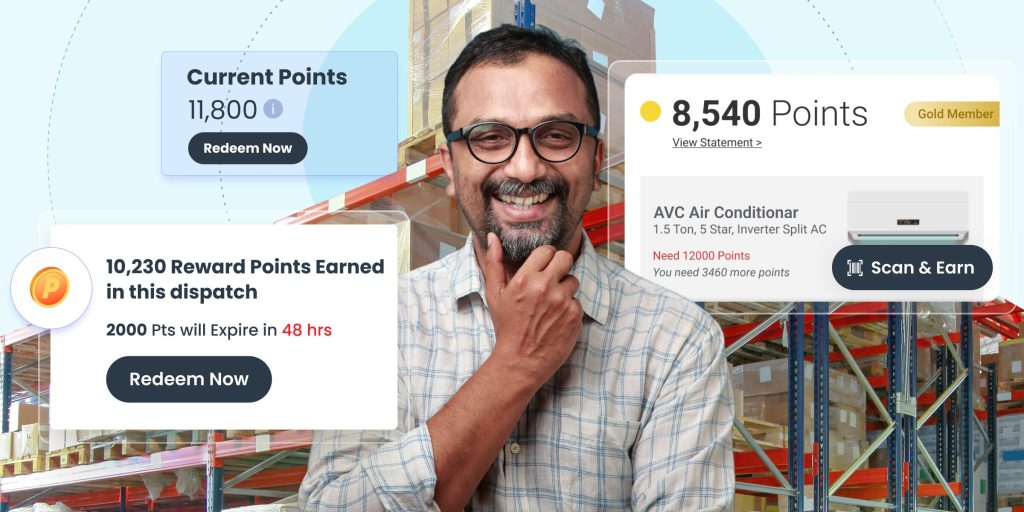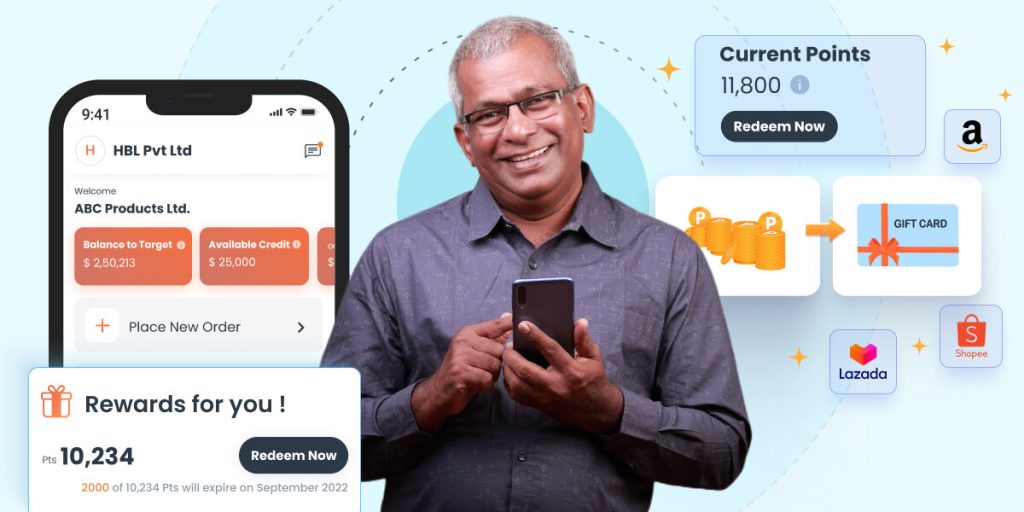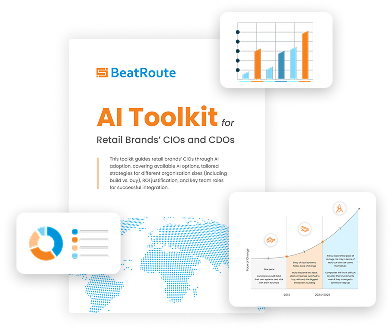How B2B Reward Programs Cultivate Dealer Loyalty

Your dealer is someone who buys from you or your distributors and sells the same products to consumers. They are usually industry specific, as in, they deal with a particular product category or industry or commodity. Their loyalty must be assured through powerful reward programs but first, we must understand that dealers are all around us – those who sell home appliances to those who sell paints or building materials – and are different from retailers in terms of fewer numbers or product type. For example, retailers deal in FMCG or CPG products, while dealers deal in comparatively slower-moving items such as electronics or products belonging to the aforementioned industries.
They may include:
- Consumer Appliances Dealers
They deal primarily in home electrical items such as washing machines, microwave ovens, televisions, etc.
- Building Materials Dealers
They sell cement, paints, tiles and other materials focused on construction.
- Bathroom Fittings and Accessories Dealers
They deal in taps, shower heads, basins, cisterns, commodes, pipes, and other accessories for daily bathroom use.
As they are consumer facing, they naturally play a big role in your route-to-market strategy, making their loyalty crucial to your brand. It directly leads to good business and long-term brand-dealer relationships.
But, does loyalty come readily, without investing towards it?
The short answer is no.
There are dozens, if not hundreds of competitors out there vying for your dealer’s attention. Here, your dealer will prefer association with brands with whom they have a strong relationship and who offer them the right incentives to do business with them. A common yet effective tactic for this is a loyalty program involving discounts, special deals, reward points, etc. that brands run for their dealers. The point is to attract dealers to buy more from you, preferably a wide range of products, and although this is a time-tested tactic, strategies around it are changing with the times.
Read on to learn everything about loyalty programs and how they pertain to dealer loyalty.
What Affects Dealer Loyalty?
Loyalty is a two way street. If you, as a brand, offer something that benefits the dealer, the dealer will go above and beyond their normal routine to help your RTM strategy. The said benefits could be quick problem solving, great schemes, and rewards.
Rewards programs – point based, tiered or cashback type deals – are supposed to offer value to the dealer. If you are one among a number of brands they are buying from, one of the best ways to stand out is to incentivise the process.
Say, they purchase a large batch of washing machines or ceiling fans or paints from you (depending on your industry). If you were to set a reward for every time they hit a certain point in transaction volume/size, number of products bought or completed a certain period of time as a channel partner, they would support your brand more.
On the contrary, the lack of rewards or rewards that are useless or dated would just frustrate them into going over to your competitors.
For example, physical coupons are not in vogue anymore, which is to say, there is a preference for digital rewards. If your company ran a loyalty program that handed out actual hand-held coupons or gift cards, it could be a problem getting it to the dealer. For the dealer to then redeem it would just be more hassle; he could even misplace it. In the same way, delivering a gift to the dealer would be an equally strenuous logistical nightmare. Dealers want ease of use, even with reward points or gifts.
The point is nobody prefers analogue loyalty programs anymore.
So ironically, your loyalty program in this case would lead to disloyalty among your dealers. We will discuss this in more detail in a later section.
How Diminishing Dealer Loyalty Affects Your Brand
- Failed product introduction
The first thing you do when you have a new product is to introduce it to your dealer(s). A dealer educated on your product runs a good chance of convincing consumers to go for it. However, loyalty is an unavoidable aspect of such efforts; dealers whom you haven’t enticed with rewards would be less likely to learn about your product. They’d likely be happy to keep going with your existing line of products, taking away from the impact of a new launch. You won’t be seeing addition of new products to their order baskets.
- Diminishing sales
There is no point in getting your products to the dealer’s if they are not going to be sold. Loyal dealers may act as ad hoc product promoters to consumers, accelerating sales. Alternatively, dealers who aren’t stimulated with rewards would not be going the extra mile for you. Naturally, the sales you saw at the start of your association with them will gradually plummet.
For example, let’s say a consumer comes to a dealership for bathroom fittings. You sell product A and your competition is B. A consumer will not be an expert on what’s best for them but they might have heard of both brands and yet, prefer B over you. A loyal dealer would steer consumers clear of B products and instead promote product A, pitching your fittings as a better alternative. They would go on to talk more about you, push your taps and showerheads, etc. and do everything possible to sell your products. A dealer who’s never seen good rewards from you will, however, not do that extra bit and the consumer would probably go home with B fittings.
- Zero to minimal range selling
Range selling is the secret to great ROI. As a brand, you improve upon your existing line by manufacturing something that will add value to consumers and your brand image. You’d want your dealers to buy in range from you and expand their order baskets, thus helping you get more of your products to consumers. Without dealer loyalty, this becomes highly uncertain as those who don’t believe in your brand will not want to break the status quo of the existing product range. Naturally, without adequate range selling, your business will never reach its potential.
For example, if you have designed new microwave oven models that do more than your base model, the manufacturing cost and overhead will be significant. They will be pricey products. You’d want your dealers to buy these from you along with the base model for all types of dealers. But if your dealer (who has had little or inadequate rewards from you) finds it more suitable to only buy your original model, it is a major concern because your route-to-market will take a hit.
- Dealers become competitor friendly
The last thing you want is for your loyal dealers to prefer your competitors over you. If other brands are offering excellent incentives and rewards based on milestones, and you are not, your dealers will consider their interests more seriously. In time, you may even lose valuable dealers to the competition because you were unable to make them feel valued. Again, it is crucial to note that everyone may run a loyalty or points program but it is very important to know what works in your industry or time and what doesn’t. Going in blind is not going at all.
Loyalty or Reward Programs: Traditional vs Digital
There is a reason why digitisation is gradually replacing most traditional processes – upgrades. Loyalty programs are no stranger to this. Traditional programs utilise plastic cards or coupons or gift items to be delivered to dealers and although this may be inexpensive in most cases, the environmental and logistical factors associated with it are discouraging.
Firstly, you need to have enough gift items or coupon cards ready to be distributed. Secondly, you need to transport these coupons/gift items to your loyal dealers. Even if you get ahead of the logistical problems associated with these, physical reward cards/coupons are prone to getting lost, thus failing to fully satisfy a dealer. These loyalty programs simply look at what your order history has been or in case of gift delivery, the gift can be damaged or lost in-transit.
Let’s breakdown the disadvantages of traditional loyalty programs below:
- Dealer performance analysis issues
It is hard to use traditional loyalty programs such as loyalty cards or coupons to track what sells best at a dealership. What this means is that you cannot target loyalty programs to create a better experience for consumers or understand what your dealership excels at. For example, you are a bathroom fittings brand and you sell all sorts of related products to your dealers. Now, if your dealer gets a lot of loyalty points or rewards, you’d want to know what product category contributed to the majority of them. Traditional loyalty programs don’t necessarily have a way of doing that.
- Misplacement
Physical coupons and gifts, as already mentioned, are in the real world and can be misplaced. This has a two-pronged effect – dealer dissatisfaction from partial or no redemption (no matter who misplaced it) and in case of a replacement clause, it becomes a major headache in terms of logistics and expenses to get another coupon to the dealer.
- Gifting issues
Traditional loyalty programs necessitate that the brands handle all gifting responsibilities; if a dealer redeems a coupon or simply wins a gift, the brand must handle transportation and all that come with it. This is highly cumbersome and even unreliable, especially for long distances.
- Counterfeiting
Anything physical like a piece of paper or a card or even a gift can be easily forged. Not that digital methods are fraud-proof but traditional loyalty coupons or cards are at a higher risk. If someone replaces or steals a coupon in transit, the dealer will inadvertently blame you for it because you, as a brand, were handling transportation. If this were to be a third party like an ecommerce portal, the blame would not fall on you in such instances.
- Limited options
Traditional loyalty programs don’t offer a lot in terms of variety. The gifts available for each milestone is limited, affecting choice. This means there will not be something for everyone and a lot of your dealers will find the limited catalogue aggravating.
- Usage issues
Like everyone else, dealers want reward information at their fingertips. This is not possible with traditional and physical loyalty programs. Things like checking reward balance, coupon type, gift tracking are not available with traditional methods, making the experience vague for dealers.
To improve dealer experience, digital rewards programs were introduced and have since gained enough prominence to become the go-to option for brands. We lay down some points that reinforce this.
- Smarter targeting
Digitisation has made it incredibly easy to allocate and reallocate points, changing gift items in the catalogue, and modifying existing targeting strategy of loyalty programs for individual dealers. The processes are highly configurable – faster, more seamless, and effective – without logistical drawbacks.
- Future proofing your process
It is quite clear that digital loyalty processes have far greater benefits in terms of security and reliability than traditional processes. Technology is a major tool that has changed the rewards landscape from even a few years ago. This makes it important for you to keep up with the times and ensure you don’t fail at something your competition excels at.
- Ease of use
Digital is always easier to use and monitor than traditional. Such is progress. When your dealer can check their accumulated points, next milestone, redemption history, available gift catalogue, etc. on their mobile or laptop screen, it beats everything that a traditional coupon system entails. It’s easier, faster, and definitely saves time. In the same vein, brands also find that digital loyalty programs remove most, if not all, of their logistical downsides. There is no need to keep a stock of physical coupons, manually track rewards redemptions, hire a transportation service, and bear the costs associated with the whole thing.
- Devoid of traditional pitfalls
Digital loyalty programs are available at your fingertips 24/7, is transparent to all concerned, cannot be lost or misplaced, offers better protection against fraud, allows the presence of a huge catalogue in the form of 3rd party entities and more.
Types of Loyalty Programs
- Points-based
Dealers earn redeemable points based on purchases and milestones that they can exchange for rewards from an online catalogue. This is great when you want your dealer to be able to choose their rewards.
- Cashback
In a cashback or rebate program, dealers like dealers are encouraged to make more purchases to earn cashback benefits. If you want your dealer to spend more, this is a good program to have in place.
- Level-based or Tier-based
As the term suggests, it’s all about rising up. The more your dealer spends on your products, the higher their tier and the better their rewards. This program is great for driving dealers to spend more on purchases to reach the best tier for the best rewards.
- Gamification of Surveys
One of the easiest ways to get dealer insights and data, gamified surveys ask your dealers to fill out a survey to get their reward. There can also be a lottery or prize draw in exchange for filling out information. This is an effective method for personalising dealer experience for future loyalty programs.
Busting Myths About Loyalty Programs
- Loyalty programs are expensive affairs
They are not! There is a common belief that loyalty programs require a lot of expenses to set up and to hire a team to manage them. Digital loyalty programs such as the ones we help you with are inexpensive yet effective.
- Loyalty programs are complex
Maybe so with traditional processes. With digitisation at the forefront of loyalty programs today, allocating or reallocating points, upgrading tiers, providing cashback, tracking the next milestone, and data analysis are easier than ever! There are no spreadsheets or creation of physical loyalty vouchers involved, making today’s loyalty programs more transparent.
- Loyalty programs are all about special discounts
Loyalty programs go far beyond simple discounts. In fact, there are many dealers who prefer value addition to discounts. For example, gifting an expensive gift such as a TV or a gold coin to your dealer for completing 5 years with you would be considered more valuable than a 50% discount on the next order!
- Loyalty programs are not for big companies
It is not about the size of your company but about keeping your dealers interested in you as a brand. Dealers will associate with your products because they sell well or have the potential to sell well, but they will stay with you in the long run because of the value you offer. It is a lot more challenging to onboard new dealers than it is to nurture existing relationships; reinvent your loyalty program from time to time to remain relevant to dealers.
Loyalty Programs: Smart Practices and Approaches
- Form the persona of your dealer whom you plan to target with your loyalty program
- Define the purpose and goals of your loyalty program with respect to your dealer
- Keep a high range of rewards so that your dealer can choose what best suits them during redemption
- Keep sharing the benefits of your loyalty programs with your dealers across available channels
- Design the loyalty program to be simple and easy to understand so that dealers can readily embrace it
- Add multiple redemption options for your dealers
- Monitor the program to improve future iterations and ensure dealer loyalty
- Have in place a dedicated customer support team for your loyalty program
How is BeatRoute a Game Changer?

BeatRoute provides a completely digital rewards experience when it comes to points generation, redemption, and gift/reward delivery upon redemption. This hugely affects elements like logistics and cost by making everything streamlined and visible.
For example, a dealer earns points regularly based on order size or product type, or when they reach a milestone of some sort, then redeems the points by purchasing gifts of their choice from a digital catalogue, and get it delivered to them.
Next, with BeatRoute, we eliminate the need for a separate loyalty program application. You can run the loyalty program on our Dealer App, which runs on a WhatsApp/Viber interface. This means that your dealers do not have to install a native app or remember login credentials since authentication via WhatsApp or Viber is automatic.
Our UI is extremely user friendly to ensure everyone from experienced tech-savvy experts to regular laymen are able to use the loyalty program without hiccups. As a brand, you get the ability to nudge dealers into meeting certain targets or reaching milestones with the allure of a reward. With digitisation, as opposed to verbal conversations, you can send immediate and recurring notifications to push dealers to perform better.
Another standout aspect of BeatRoute is that it’s absolutely configurable; you can choose how many points you want to assign for a product, you can reallocate points based on your strategy, and you can change your targeting as necessary.
Let’s say you have assigned points for a high-quality showerhead. You see excellent sales with most of your products but not with this new showerhead. The reason could be anything from lack of dealer awareness about this new product or an indifference towards it. With BeatRoute, you can immediately reassign reward points to the showerhead to make it even more lucrative for dealers. Naturally, the dealers will buy this product, push it to consumers more and you will likely see a rise in sales for it.
BeatRoute also supports versatile integration with multiple SFA, ERP, and DMS tools that you may already have. This means you don’t have to drop everything for us to help you but can continue with the tools you are used to. BeatRoute will easily grab the data it needs and work seamlessly.
Why don’t you try our free demo? It’s awesome!
About the Author
-
Apart from being a Senior Content Writer at BeatRoute, Soham is an avid reader of science fiction and suspense novels (Doyle, Christie, Brown or anybody great!) He also dabbles in historical narratives and wonders about our place in the universe. Cosmic viewpoints, Carl Sagan, and Neil deGrasse Tyson intrigues him. When not reading, you may find him spending his weekends or after-work hours watching a fulfilling movie with his family.
Use Goal-Driven AI to Achieve Retail Sales Uplift, Today!
Join enterprises in 20+ countries that trust BeatRoute, the globally dominant AI platform for sales force automation, field sales, DMS, and eB2B
Latest Insights & Articles
Here are the most impactful articles, platform updates, ebooks and reports for you.



